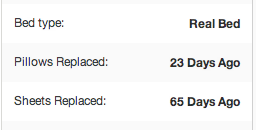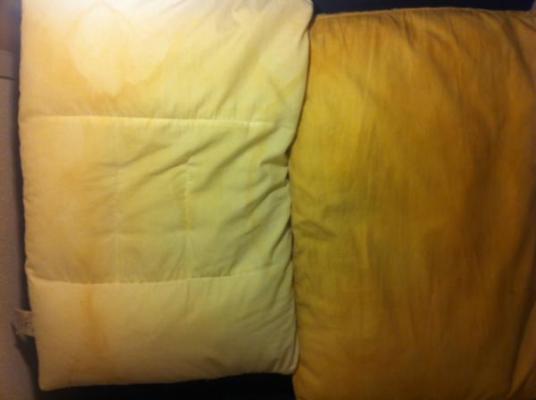[Editor’s Note: Brenden Mulligan is an entrepreneur who created Onesheet, TipList, ArtistData, MorningPics, and PhotoPile. He’s a mentor for 500 Startups and several startups. You can find him on Twitter at @mulligan.]
When my wife and I travel, we rarely stay in hotels. We usually either stay in hostels or apartments. The apartments are usually found and booked on Airbnb. We’re big fans of the service, and think it’s one of the best ways to experience a foreign city. However, some recent events have made me think a bit deeper about this maturing marketplace and the whole spectrum of collaborative consumption services.
We are currently on a trip to Tokyo for an speaking engagement and some mentoring of the teams at Open Network Lab, a Tokyo-based incubator I wrote about last fall during our last Tokyo visit.
Last night, we arrived to our apartment. The amenities and space was almost exactly as described. But there was something about our place that didn’t appear in the Airbnb description, which almost made us walk out immediately: the cleanliness of the bedding.
Luckily, both the host and Airbnb have been extremely responsive and helpful with the issue and we’ve got it resolved (the pillows and sheets are being replaced). But it got me thinking about a few subtle aspects of collaborate consumption.
Lack of Consistent Health / Cleanliness Standards
When you stay at a hotel, there’s a certain level of cleanliness you expect. That level is probably directly proportional with the price you are paying, but even at budget hotels, you still expect a decently clean room. And the worst case scenario is that your room isn’t what you want, you can try to switch to one that’s more suited for your needs.
But personal apartments are different. There is no baseline of cleanliness, and no immediate options if it doesn’t suit your needs. If when you check into a hotel room, you see a big stain in the middle of the bed, you can ask to switch rooms, or at the very least to get new sheets. But when you check into an apartment in a foreign city, you don’t have that option. There’s a small chance you can be moved to a different apartment, but that might be in a totally different neighborhood, with different amenities, etc..
I think that’s a subtle but very important dynamic. Essentially, when you choose to stay in an apartment, you are making a gamble. Most of the time, the gamble results in a more positive overall experience, but in the times it doesn’t, it really leaves a negative impression.
Sometimes the trade off of a more local experience isn’t worth the chance of dirty sheets.
I’ve found a similar experience when renting cars from RelayRides, GetAround, or Zipcar. In general, the interiors of the vehicles are dirtier than a traditional rental cars. The reasons for this are obvious. Rental car companies prep the cars for each renter, the same way hotels clean / prep the rooms for each guest. But with the economics of car sharing by the hour, it doesn’t make sense to professionally clean a car every time someone wants to pay $10 to take it to IKEA.
As more of these companies come into existence, it’ll be interesting to see if a set of standards is developed so renters / guests can come to expect a certain amount of cleanliness when reserving a car/apartment/etc…. That will most likely increase consumer confidence in these services and take them closer to mainstream use.
Professionals service providers are more attune to when items “expire”
Hotels make a business out of rotating people through its rooms night after night. I’ve never worked in the industry, but I’d assume there is some kind of schedule about when they replace certain things. For example, maybe a hotel has an internal policy to replace the pillows once a month.
But most people renting their spaces on Airbnb or Homeaway probably don’t think about this stuff, because they’re not professionals. They are just making some extra cash from their places.
 It’d be interesting to see these services help owners by adding some alerts to their dashboard. Maybe after they have logged 60 consecutive days of bookings, an email is sent to the host saying “We recommend you replace the pillows and sheets”.
It’d be interesting to see these services help owners by adding some alerts to their dashboard. Maybe after they have logged 60 consecutive days of bookings, an email is sent to the host saying “We recommend you replace the pillows and sheets”.
Even better, maybe there’s a way for the hosts to mark in their account that this has happened, so potential renters can see “Pillows replaced 23 days ago” in the profile. I know this seems minor but think about it: you are smashing your face (and mouth) into the pillow for 8 straight hours. You should care about how many other people did this on the same pillow.
TripAdvisor brought transparency to hotel photos; Airbnb… professional photographers
When TripAdvisor launched, it gave us all an opportunity to see what hotel rooms actually look like. It was amazing. We got to see beyond the stock photos hotels post on their website and get a glimpse of what the real bed and bathroom we will be experiencing. It was great, and brought accountability to the whole industry.
But Airbnb seems like the opposite from a photography standpoint:
We extend a professional photography program that offers immense value. Professionally photographed listings get booked twice as often as those without professional photography since high-resolution photos really showcase your space.
Source: Airbnb Support
This is an awesome service that they provide and they’re really smart to do it. They bring in a photographer — with a wide angle lens, it seems like — to stage the apartment and make it feel as bright and spacious as possible. And it works; the places look huge!
But this also has negative consequences. For almost every apartment I’ve rented on Airbnb, my first thoughts were “this is smaller than it looked online”. I’ve come to expect this, so it’s never a surprise, but for new Airbnb-ers, it could be a turnoff.
But this doesn’t bother me. The thing that bothers me is that although they let me write reviews, I can’t post my own photos.
I want to see the glamor shots, and think they should always appear on the front page, but I also think it’d be useful to see the real photos of these places. I can see why Airbnb wouldn’t want that on their site (because the renter photos will undoubtably look MUCH worse than the provided ones), but it’d be nice for this to exist somewhere.
Regardless if it’s apartments, cars, or hotels, when you rent from a well known brand, you inherently start with a basis of trust in how the end product will appear in comparison to how its represented on their website. When renting from another person, there isn’t that basis of trust, which is why reviews from other users are so important and the addition of visual elements can enhance those reviews.
Going Forward
Collaborative consumption is amazing and is here to stay. But as these services grow in usage and enter the mainstream, they will continually need to add more elements that make the experience across their inventory more consistent.
I can’t wait to continue to watch as this dynamic matures and see the new things that become standard across these sharing marketplaces.
